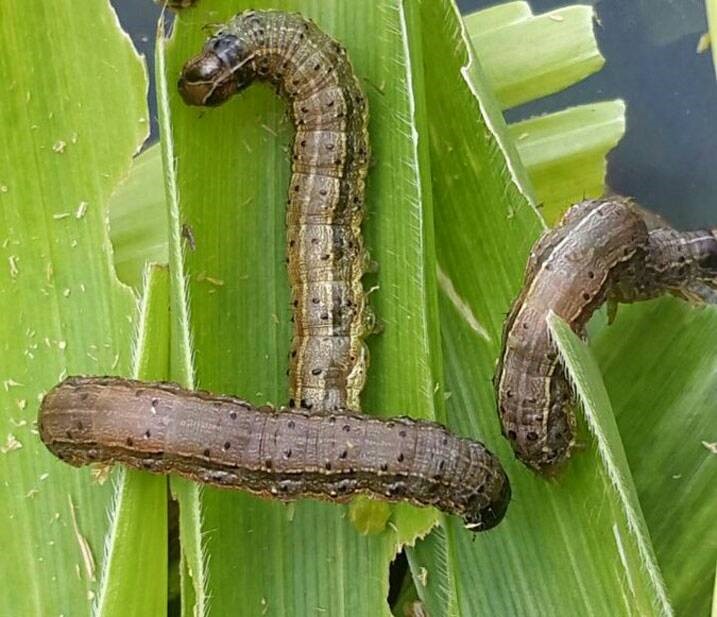USAID Supports Farmer Education and Community Action to Combat Fall Armyworm in Rwanda
Bugesera, Karongi, Nyabihu, and Ngororero districts are among the hardest-hit areas of the deadly Fall Army Worm (FAW) pest attacking maize. FAW is an invasive pest that can cause significant yield losses if not well managed. It can reproduce multiple times each year, and the moth can fly up to 100 km per night. However, the pest can be controlled through the use of appropriate pesticides and early detection.
Over 760 hectares have been the most impacted by FAW across three districts of Bugesera, Ngororero, Nyabihu, and Karongi, and farmers are feeling the effects. FAW is expected to wreak havoc if farmers aren’t prepared to combat it in time. Farmers need knowledge about the early warnings of the pest markings before they multiply. Last year alone, FAW infested an estimated 17,521 hectares of maize out of over 60,000 hectares in season 2018 B. Farmers were thus more than alarmed about the potential losses to their crops.
To respond to this challenge, through the Feed the Future Rwanda Hinga Weze activity, which aims to sustainably improve agricultural productivity and increase smallholder farmers’ income and nutritional status, farmers rapidly moved to work with stakeholders on the ground to combat FAW and reduce its destruction of yields, particularly for maize in season 2018 B.
Hinga Weze worked hard to build the capacity of key players to fight FAW through trainings on Integrated Pest Management delivered through Farmer Field Schools and Farmer Promoters, reaching over 29,000 farmers. One of these farmers, Musabimana Pilipila, 35, is a smallholder farmer in Sangati cell, Nyabivumu sector in Karongi district. She was among those hit hard by the FAW.
She expected the yield from her 0.4 hectares to benefit her family of four children. However, FAW attacked her maize plantations.
As a participant of Hinga Weze, Pilipila has been able to access pesticides and acquire new knowledge on effective pesticide application through a local agrodealer. Her prospects after the training seem promising as she explained that ”I have been able to fight FAW massively by accessing appropriate pesticides and modern spraying equipment, thanks to Hinga Weze staff who have been with me throughout the process,’’ she said.
Hinga Weze bought and distributed spraying pumps and protective equipment to all ten districts’ intervention areas, and Hinga Weze district staff continued to train farmers on how to use safe pesticides to combat FAW. Hinga Weze also linked hundreds of farmers with agrodealers to improve access to the pesticides of their choice. So far, 245 agrodealers are working with Hinga Weze to provide modern, affordable spraying equipment and better seeds to farmers across the ten target districts.
Since maize is a staple food for Rwandans, Hinga Weze district staff have been supporting farmers together with district stakeholders in targeted districts to fight FAW infestation. ‘’On many occasions, I am personally involved in picking FAW with farmers to demonstrate the urgency of intervention to fight FAW on time,’’ said Hinga Weze’s agronomist in Karongi district.


